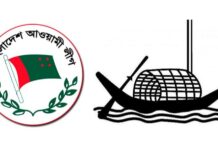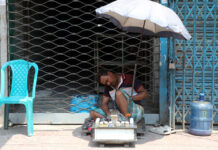
By Kamran Reza Chowdhury on Jul 07,2022
Benar News
Bangladesh Prime Minister Sheikh Hasina on Thursday called for U.S. sanctions imposed on Russia for invading Ukraine to be lifted on the grounds that Moscow was not restrained while people in her country and across the globe, including Americans, have suffered.
Hasina appears to be the first head of the government to urge the sanctions be lifted, according to a diplomatic observer. She previously challenged U.S. sanctions against her nation’s elite police unit.
“America should consider that the sanctions [against Russia] are hurting their own people,” Hasina said during a virtual ceremony to open an eight-story foreign ministry building.
“Your sanctions are targeted at pressuring Russia. But to what extent are they feeling the pressure,” Hasina said. “All countries irrespective of status – developed, developing and low-income countries – have been suffering.”
U.S. President Joe Biden, joined by partners and allies, announced the sanctions on Feb. 24, the day Russia invaded Ukraine.
On Thursday, Hasina said Russia’s ongoing war with Ukraine has led to economic risks at a time when much of the world was starting to recover from the COVID-19 pandemic.
“These U.S sanctions have been creating obstacles for our imports. Not only that, the transport cost has been increasing,” said Hasina, noting the U.S. and Europe have suffered as well.
“Possibly, now you can see that regulating a country through sanctions does not work,” she said.
“We need fertilizer, we need diesel, we need other ingredients to increase our production. But we are not getting these. This is not fair to deprive the people of their rights,” Hasina said, comparing the shortages attributed to the sanctions to rights violations.
The U.S. State Department did not immediately issue a response to Hasina’s comments.
Faruk Khan, the chairman of the parliamentary standing committee on foreign affairs, told BenarNews that Hasina’s comments had national and international implications.
“Sheikh Hasina is the first leader to talk about the negative global consequences,” he said. “She talked in the presence of many diplomats. The purpose of these comments is to pass on a message of the global problems caused by the sanctions.”
He noted that the war has caused Russia and Ukraine to curb wheat and grain production.
“It is feared that famine may erupt in the next two years,” Khan said.
Domestically, Hasina “alerted the people to be thrifty and she tried to make the people aware of the impending global problems caused by war.”
Khan said Bangladesh was an energy importing country where 65 percent of its electricity is created from locally produced and imported liquefied natural gas (LNG). As the price climbs, the government has halted imports.
“So we see the shortage of LNG and electricity. It negatively affects our economy,” Khan said.
However, a student in Rajshahi, a city near the border with India, questioned the government’s claims regarding shortages.
“Actually, the prime minister has tried to attribute the current domestic problems such as price hike of essentials and gas and electricity shortages to the sanction on Russia and the war in Ukraine,” student Saidul Islam told BenarNews.
Jokowi visit
Hasina is not the only regional leader to express concerns about the need for peace between the two warring nations.
Indonesian President Joko “Jokowi” Widodo last week traveled to Ukraine to meet President Volodymyr Zelenskyy and to Russia to meet President Vladimir Putin. The Russian president told Jokowi the ongoing food problems in the world have been caused by the Western sanctions.
In its April report, the Global Crisis Response Group, set up by the United Nations secretary general, said Ukraine and Russia provide 30 percent of the world’s wheat and barley, a fifth of its maize and more than half of its sunflower oil. Russia is the world’s largest natural gas exporter and second largest oil exporter.
Analyst Zachary Abuza said the Russian narrative that the war is the fault of Ukraine and Western nations is resonating in the global south.
“Russian disinformation campaigns and social media machinery is pumping out that narrative all the time,” he told BenarNews.
Abuza discussed the Indonesian leader’s June visit to Russia. Jokowi, who leads the G20 this year, was in the region after attending G7 meetings in Germany as an observer.
“Jokowi believes that if he toes Moscow’s line, Putin will reward him with increased wheat exports and subsidized energy,” said Abuza, a professor at the National War College in Washington and an adjunct at Georgetown University. “I think that is exactly what Sheikh Hasina is calculating.”
Meanwhile, former Foreign Secretary Md. Touhid Hossain, noted that the sanctions have hurt Bangladesh and other countries which import oil and gas, but he was not sure what will happen next.
“It is hard to predict whether the [Bangladesh] government will pursue a foreign policy in line with her comments. She might not guide government policy according to today’s comments on sanctions,” Hossain said. “We have to wait to see how the western governments respond.”
Shamsher Mobin Chowdhury, another former foreign secretary, said Hasina tried to separate the sanctions hurting common people from Russia’s war effort.
“This war has negatively impacted the global food supply chain. Our prime minister stressed that the war ships should be stopped, but cargo ships should not be blocked,” Chowdhury said.
Fallout from the U.S. action against Russia comes at a time when the Bangladesh government is dealing with Washington’s sanctions linked to the Rapid Action Battalion police unit and six of its current and former officers.
“Widespread allegations of serious human rights abuse in Bangladesh by the Rapid Action Battalion (RAB) … threaten U.S. national security interests by undermining the rule of law and respect for human rights and fundamental freedoms, and the economic prosperity of the people of Bangladesh,” the U.S. Treasury Department said in a statement announcing the sanctions in December.









